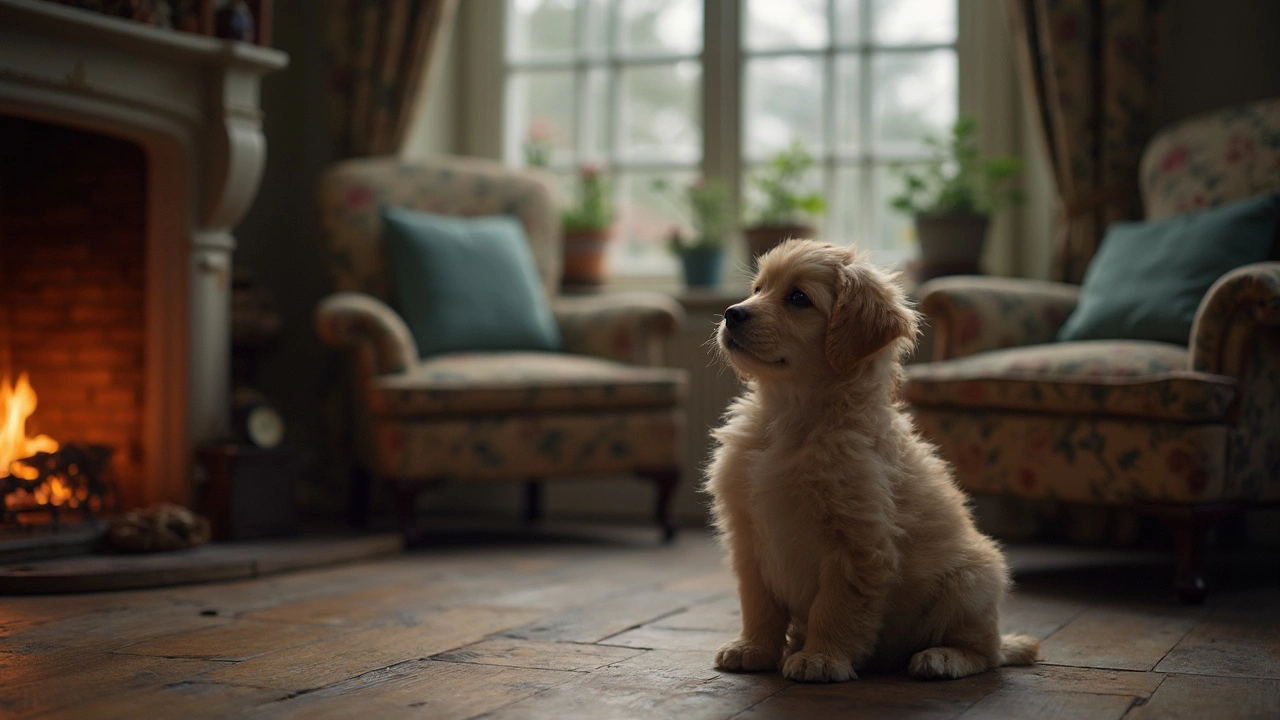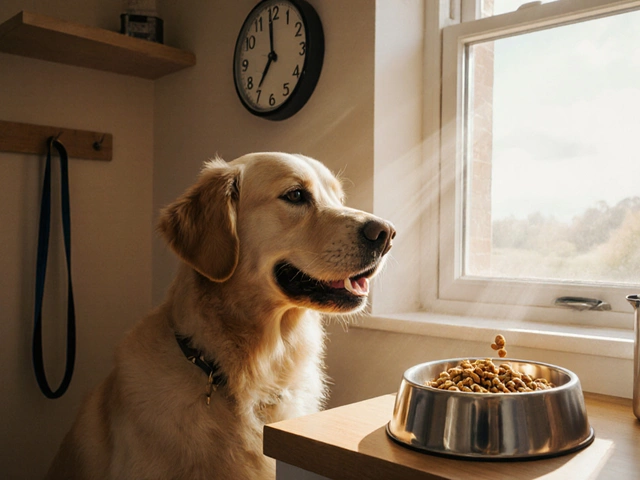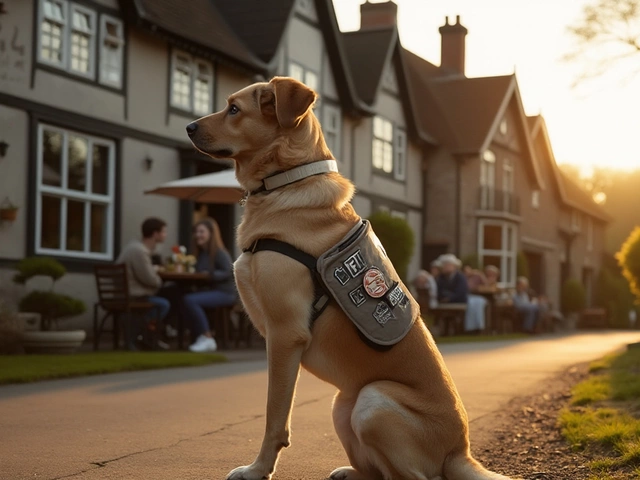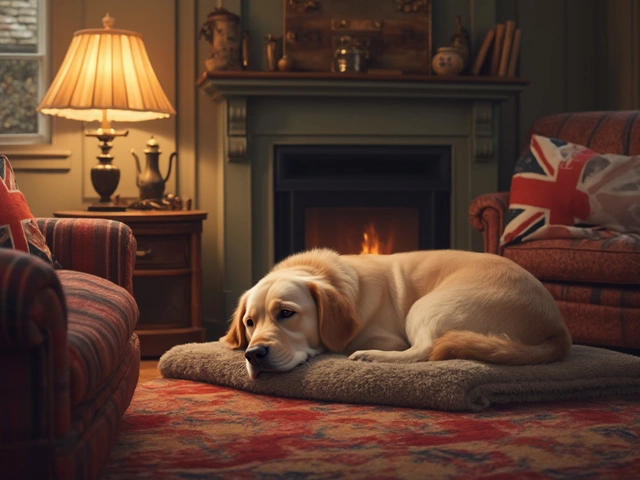If you've ever had a puppy, you've likely spent a few sleepless nights wondering what you should do when they start crying. It's a common dilemma for pet parents: should you comfort them or ignore the cries in hopes they'll learn to settle themselves? The good news is, you're not alone in this. Countless new puppy owners face the same challenge.
Puppy crying at night usually stems from a mix of loneliness, adjustment issues, and needing to relieve themselves. They're away from their litter and in a new environment, which is understandably unsettling for them. It's hard to resist the urge to rush in and soothe them. But is that always the best course of action?
Ignoring your puppy's cries altogether might seem like the advice of seasoned dog trainers, but the truth is a bit more nuanced. Completely ignoring your puppy can sometimes make the situation worse, especially if they're genuinely uncomfortable or need the bathroom. It's about finding a balance between teaching them to self-soothe and being responsive to their legitimate needs.
- Understanding the Crying
- Why Puppies Cry at Night
- To Comfort or Not
- Building Nighttime Routines
- Practical Tips for a Quiet Night
Understanding the Crying
Puppies crying at night can tug at your heartstrings, but to effectively address it, we first need to understand why it's happening. Crying is a common behavior observed among young puppies, especially during the first few nights in a new home.
Initially, it helps to remember that puppies are like human babies in many ways—they use crying as a primary tool to communicate. One main reason your puppy might be crying is due to separation anxiety. Being away from their litter and mother for the first time is a major shift. Your home is full of new sights, sounds, and smells, and they're navigating a whole new world without their familiar comfort zone.
Another reason for the nightly cries is the need for bathroom breaks. Their bladder is small, and they can't hold it in for long periods. Puppies usually need to relieve themselves every couple of hours. So, if your puppy is crying in the middle of the night, it could simply mean they need a restroom break.
There's also the chance that they're just bored. Puppies are energetic and inquisitive creatures. If they're not tired when bedtime rolls around, they might express their pent-up energy through vocalizations. Having a good physical and mental routine during the day can significantly help reduce nighttime crying.
- Separation Anxiety: Missing their litter motivates whining.
- Bathroom Needs: Their small bladders mean frequent bathroom breaks.
- Boredom: Lack of energy outlet during the day leads to complaints at night.
Recognizing these reasons can aid you in deciding the best course of action to minimize nightly crying. Sometimes, knowing whether to comfort or let them be comes down to observing and understanding these cues.
Why Puppies Cry at Night
Nighttime can be a tough adjustment for your furry little one. Puppies often cry at night because they're experiencing a mix of loneliness, anxiety, and even physical discomforts like needing to relieve themselves. Imagine being whisked away from your comfy familiar world with mom and siblings into a big, strange place. It's no wonder they cry!
Puppies are naturally social animals. In the wild, their instinct is to stay close to their pack for safety and comfort. When they're away from their litter, it's like they're calling out for the warmth and presence of their family. Separation anxiety usually kicks in during the nighttime when everything is quiet and dark.
Another big reason is the need to go potty. Puppies have tiny bladders and often need to relieve themselves more frequently than adult dogs. While some might make it through the night without issues, others still need that late-night bathroom break.
It's also helpful to know that puppies usually sleep around 18-20 hours a day, but this sleep isn't always continuous. Their sleep cycles might not match yours, leading to bouts of restlessness when you're trying to sleep!
Understanding these factors is key to supporting your puppy through the night without reinforcing the crying habit. Knowing why they're distressed helps you respond in ways that ease their anxiety while setting the stage for better sleep patterns in the future.
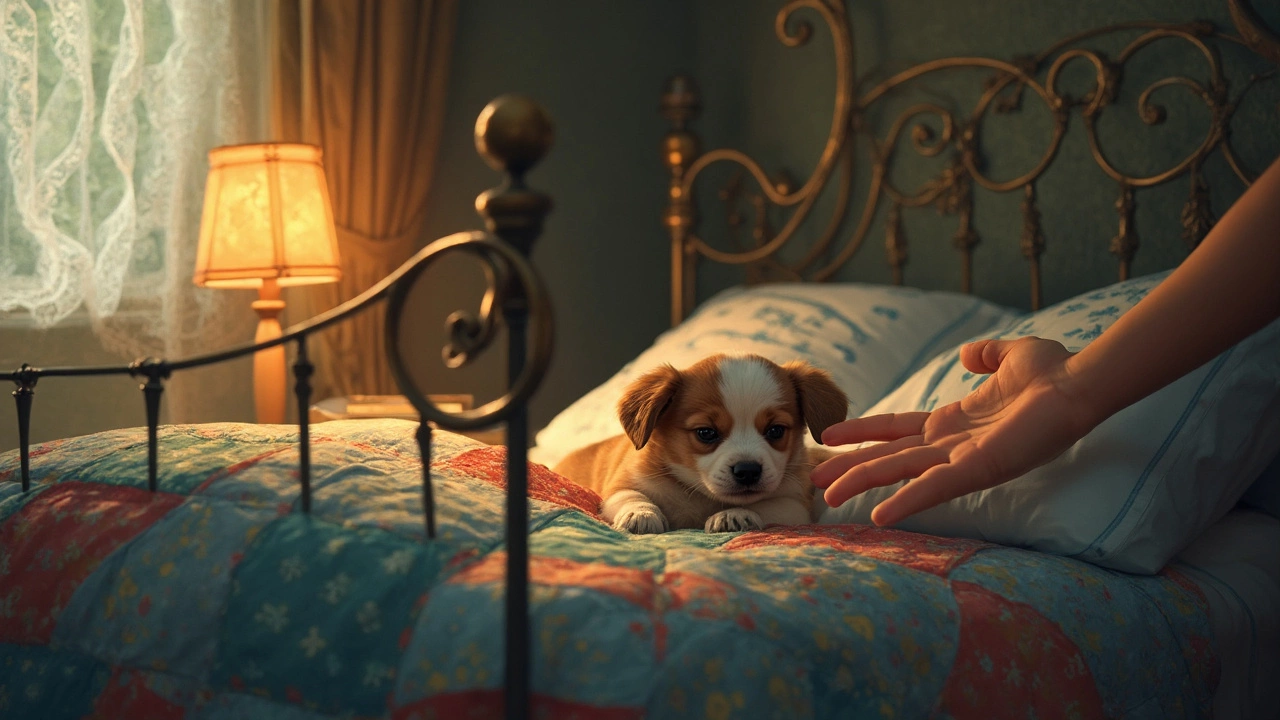
To Comfort or Not
The big question weighing on most puppy owners' minds at night is whether to respond to their puppy crying or let them cry it out. It's a sensitive subject and needs a balanced approach. For starters, understanding why your puppy is crying is key, as their reasons can vary from fear and insecurity to physical needs.
Young puppies, especially in the first few weeks in their new home, often cry because they're not used to being alone. Separation anxiety is real, and during the daytime, they have the comfort of family around them. So, comforting your puppy at night initially might be necessary to ease them into self-soothing.
However, don't rush to them at the first whimper. Consider whether they've eaten, relieved themselves, and had enough active play during the day. Puppies generally need to eliminate during the night, especially at a young age. If it's about 4-6 hours since their last toilet break, it's legitimate to let them out briefly.
- Check if they might be crying from hunger, thirst, or need for a bathroom break.
- If all their needs are met, gently comforting them by using a phrase or softly talking from a distance may help settle them without allowing them to become fully reliant on your presence.
Sleep training is a gradual process. Start by placing their crate in your room, allowing them to sense your presence. Over time, you can slowly move it farther away. This approach strikes a balance, making it clear to your pup that night times are for rest without completely leaving them feeling abandoned.
| Sleep Duration (Puppies) | Average Need |
|---|---|
| 0-12 weeks | 18-20 hours a day |
| 3-6 months | 16-18 hours a day |
This isn't a one-size-fits-all solution, and much depends on your puppy's temperament, breed, and age. Be patient, and remember that each cry is a part of their adjustment and growth. All while you are navigating this journey of puppy care together.
Building Nighttime Routines
Setting up a solid nighttime routine is like a secret weapon when it comes to handling your puppy crying at night. Puppies thrive on structure, and creating a consistent pattern can help them feel secure and more likely to sleep through the night.
First off, think about their evening activities. Make sure your puppy gets plenty of playtime and exercise in the hours leading up to bedtime. It helps burn off energy and increases the likelihood of them feeling tired and ready for sleep. But don't schedule this too close to bedtime to avoid overstimulation.
Next, establish a calming bedtime ritual. This can include a quick trip outside for a bathroom break, a little bit of quiet play, or some gentle stroking, so they know it's time to wind down. Stick to the same order every night so your puppy learns what to expect.
Feeding also plays a key role. Plan their last meal at least a couple of hours before sleep to give their little bodies enough time to digest and reduce the need for bathroom trips at night.
A comfortable sleep environment matters, too. Many puppies feel secure in a crate. It mimics the cozy feeling of a den that most dogs love. Throw in a blanket and a comforting toy, but be careful if your puppy is prone to chewing everything. Keeping their sleeping area consistent also helps reinforce where they should sleep.
Wrap these tips together and stick with them consistently. Puppies do best with routine, and by setting up a good one, you’re easing nighttime disturbances and helping them feel more at home. And remember, patience is key! You might not get it perfect right away, but with time, your efforts will pay off, leading to better nights for both you and your furry friend.
| Activity | Recommended Timing |
|---|---|
| Exercise | 2-3 hours before bedtime |
| Last meal | 2-3 hours before bedtime |
| Pre-bedtime bathroom break | Just before bedtime |

Practical Tips for a Quiet Night
Getting your puppy to sleep through the night without crying can feel like a big task, but with the right approach, it gets easier. Here are some practical tips to help you both get a good night's rest.
- Establish a Bedtime Routine: Just like kids, puppies thrive on routine. Try to keep a consistent schedule each night with activities that signify winding down, like a short walk or some cuddle time. This helps your puppy understand that it's time to settle down.
- Make the Crate Comfortable: Ensure your puppy's crate is a cozy place. You can add a soft bed or blanket, but be careful with chewable items. The crate should feel like a safe and comfortable refuge.
- Puppy Proofing: To minimize anxiety, ensure the room where your puppy sleeps is free of things that might unexpectedly startle them during the night, like precariously placed decor.
- Late-Night Potty Break: Part of the reason your puppy might be crying is that they need to relieve themselves. Take them out for one last bathroom break right before bedtime to prevent overnight accidents.
- Leave a Calming Sound: Consider leaving a sound machine or soft music playing. Gentle background noise can help mask sounds that might disturb your puppy.
These strategies might not eliminate all crying immediately, but with patience and consistency, you'll likely find yourself with a quieter, more restful night. Remember, understanding and addressing your puppy's needs is essential for helping them feel secure and teaching them to settle independently.
If you're curious about your puppy's sleep patterns, here’s a quick fact: puppies can sleep up to 18 hours a day! That's a lot of snooze time, and with these tools, more of those hours will hopefully be at night.

